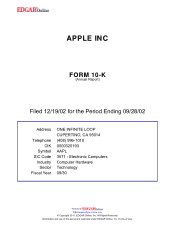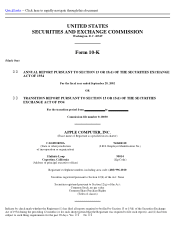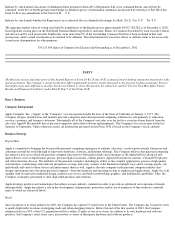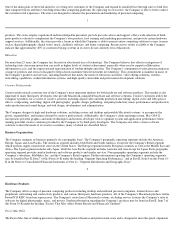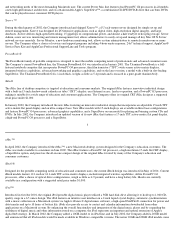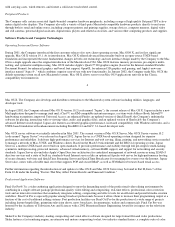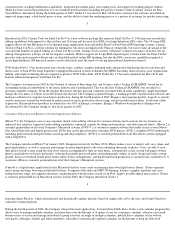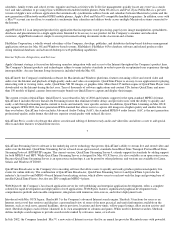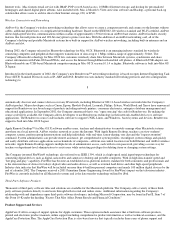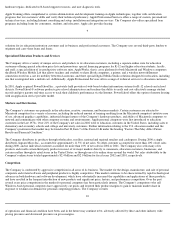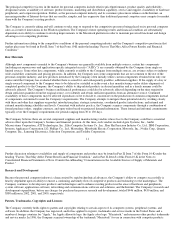Apple 2002 Annual Report Download - page 10
Download and view the complete annual report
Please find page 10 of the 2002 Apple annual report below. You can navigate through the pages in the report by either clicking on the pages listed below, or by using the keyword search tool below to find specific information within the annual report.
hardware repairs, dedicated web-based support resources, and user diagnostic tools.
Apple Training offers comprehensive system administration and development training on Apple technologies, together with certification
programs that test customers' skills and verify their technical proficiency. Apple Professional Services offers a range of custom, personalized
technical services, including Internet consulting and setup, installation and integration services. The Company also offers specialized loan
programs including loans for consumers, students, and educators. Apple also provides leasing
9
solutions for its education institution customers and its business and professional customers. The Company uses several third-party lenders to
originate and carry these loans and leases.
Specialized Education Products and Services
The Company offers a variety of unique services and products to its education customers, including a separate online store for education
customers offering special education price lists and promotions; special financing programs for K-12 and higher education students, faculty,
and staff; a special edition of its productivity software suite, AppleWorks, that is cross platform for both Macintosh and Windows computers;
the iBook Wireless Mobile Lab that allows teachers and students to share iBook computers, a printer, and a wireless network/Internet
connection stored on a cart for mobility between classrooms; and three special Digital Media Studio solutions designed for education, including
one that is integrated into a mobile cart. Additionally, Apple Professional Services offers a range of technical services to education customers.
In 2001, Apple acquired PowerSchool Inc., a privately held provider of web-based student information systems for K-12 schools and school
districts. PowerSchool ® software products give school administrators and teachers the ability to easily and cost-effectively manage student
records and give parents real-
time access to track their children's performance via the Internet. PowerSchool offers the option of remote hosting
with an application service provider model.
Markets and Distribution
The Company's customers are primarily in the education, creative, consumer, and business markets. Certain customers are attracted to
Macintosh computers for a variety of reasons, including the reduced amount of training resulting from the Macintosh computer's intuitive ease
of use, advanced graphics capabilities, industrial design features of the Company's hardware products, and ability of Macintosh computers to
network and communicate with other computer systems and environments. Apple personal computers were first introduced to education
customers in the late 1970s. Over 21% of the Company's net sales in 2002 were to education customers in the United States, including sales to
elementary and secondary schools and college and university customers. Further information relating to the U.S. education market and the
Company's position in that market may be found in Part II, Item 7 of this Form 10-K under the heading "Factors That May Affect Future
Results and Financial Condition."
The Company distributes its products through wholesalers, resellers, national and regional retailers and cataloguers. During 2000 a single
distributor, Ingram Micro Inc., accounted for approximately 11.5% of net sales. No other customer accounted for more than 10% of net sales
during 2000, and no individual customer accounted for more than 10% of net sales in 2002 or 2001. The Company also sells many of its
products and resells certain third-party products in most of its major markets directly to consumers, education customers, businesses, and
certain resellers through its retail stores in the United States, or through one of its online stores around the world. Net sales attributable to the
Company's online stores totaled approximately $2.4 billion and $2.0 billion for fiscal years 2002 and 2001, respectively.
Competition
The Company is confronted by aggressive competition in all areas of its business. The market for the design, manufacture, and sale of personal
computers and related software and peripheral products is highly competitive. This market continues to be characterized by rapid technological
advances in both hardware and software development, which have substantially increased the capabilities and applications of these products,
and have resulted in the frequent introduction of new products and significant price, feature, and performance competition. Over the past
several years price competition in the market for personal computers has been particularly intense. The Company's competitors who sell
Windows-based personal computers have aggressively cut prices and lowered their product margins to gain or maintain market share in
response to weakness in demand for personal computing products. The Company's results
10
of operations and financial condition have been, and in the future may continue to be, adversely affected by these and other industry wide
pricing pressures and downward pressures on gross margins.

